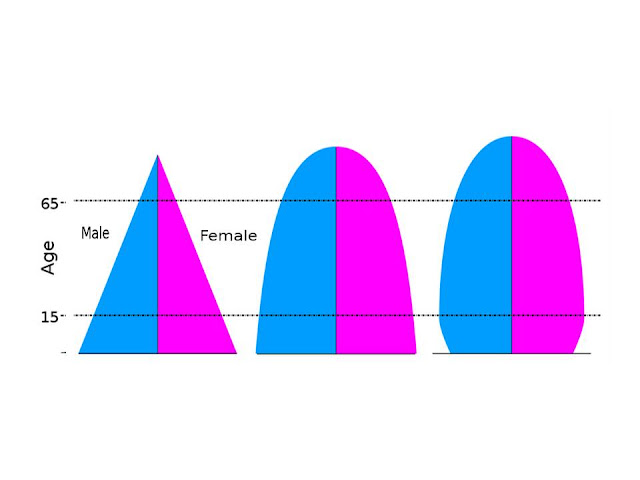4.
Age
distribution
Age
distribution of a given population can be defined as the total number of
organisms distributed in different age groups. It influences other population
characteristics such as natality, mortality and reproductive rate. Age can be
expressed in terms of pre- and post-reproductive or else in terms of years,
months or even days. By understanding the age structure or distribution we can
predict about the future population and categories into expanding population,
stable and declining population. If individual are more distributed in
reproductive phase than post-reproductive phase, the population is termed as
expanding population. If the individuals are distributed almost equally in both
reproductive and post reproductive phase, the given population is stable while if
the distribution is more in post-reproductive phase, the population is
considered as declining population.
Age pyramids
Age
polygons or pyramids are representing model to depict the age distribution in
population where the relative width of successive bar represent the number of
individuals distributed in different age groups at a particular time. The age
pyramids are hypothetically categorized into three types:
i.
Bell
shaped Age Pyramids
It’s
a representative form of expanding population. The broad horizontal base of
polygon represent the higher distribution of young organisms and thus,
expanding population. It is characterized by exponential growth and high birth rate
in a population at a particular time.
ii.
Dome
shaped Age Pyramid
It
represent a stable population where the distribution of young to old is in
equal proportion depicted by the equal width of horizontal zones of
pre-Reproductive and reproductive phase. The post-reproductive phase is
smallest in this form of representation.
iii.
Urn
shaped Age Pyramid
It
represents a declining population where the smallest distribution of organism
is in pre-reproductive phase.
 |
Figure 7: Age distribution in Age
pyramids, (a) Bell shaped, (b) Dome shaped and (c) Urn shaped age pyramids.
|

No comments:
Post a Comment